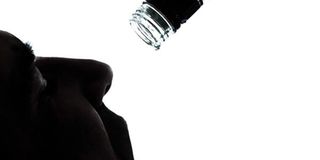Handling problem of excessive drinking

That excessive drinking is a serious problem in Britain is not in dispute. PHOTO | FILE |
What you need to know:
- Treatment: In a society where health care at the point of need is free, should people who suffer alcohol induced problems be charged?
- That excessive drinking is a serious problem in Britain is not in dispute.
When a specialist group of MPs met to discuss problem drinking, they suggested that bottles of alcohol should carry health warnings — an idea that was met with widespread scorn, if a quick scan of the blogosphere is anything to go by.
“Condescending nonsense,” said one poster; “like labelling a cliff edge as dangerous,” said another; “warnings about something everyone knows is dangerous will not solve the problem,” said a third.
Man-in-the-street solutions included raising prices, making alcohol harder to get, putting calorie content on labels, restricting advertising, treating drunkards harshly and addressing the reasons some people drink too much — family breakdowns, job insecurity, lack of support.
That excessive drinking is a serious problem in Britain is not in dispute, and Northern Ireland’s Health minister, Edwin Poots, expressed concern about the numbers who require treatment because of their own irresponsible behaviour. He said he sees merit in the idea of charging fees to patients who end up at hospital through alcohol or drugs.
SERIOUS OVERCROWDING
Health care in the UK is free at the point of need and many Accident and Emergency departments report serious overcrowding, especially at weekends. Officials believe delays may have contributed to the deaths of five patients in Belfast.
Colette MacRuagan’s 81-year-old mother died at the Royal Victoria Hospital after being admitted with a head injury. “Even when she was seen, it was hours after that before she was scanned,” she said.
Between April and June, targets to treat patients within 12 hours were missed more than 700 times in Northern Ireland, according to the latest data.
Mr Poots said that the principle of charging people seeking treatment for conditions caused by alcohol or drugs “has merit.” But implementation could be tricky. “We must ensure that people who need medical care are not put off seeking it.”
***
When I wrote last week of a “modest £400” (Sh59,000) per week earned by a former professional footballer, I had an inkling that someone would get over-excited. True enough, reader Esquire declared that a “modest” 400 quid a week for stacking cargo was almost enough to make him seek asylum.
Certainly, such a wage would represent abundant riches in Kenya, but Esquire makes the common error of applying the figures of one economy to that of a radically different one.
The average UK salary is £26,500 (Sh3.9 million) per annum, so Kevin’s £20,800 is actually on the low side, better than a barman’s £7,317 (Sh1.0 million) or a shop worker’s £11,174 (Sh1.6 million), but below that of a security guard (£20,841, Sh3.0 million), a bus driver (£23,095, Sh3.4 million) or a barrister (£45,571, Sh6.7 million). And far below an MP’s £66,396 (Sh9.8 million).
Also, before he even gets his pay packet, 20 per cent will have been deducted for Income Tax. True, a visit to the hospital would be free, but for medication he would pay £8.50 (Sh1,255) per prescription. And dental work must be paid for.
A visit to the supermarket or the corner grocery store might confront Kevin with these prices: Loaf of bread 80 pence (Sh118), kilo of caster sugar £1.48 (Sh218), 500 gm of flour 60 pence (Sh88), 1.1 litre bottle of milk 89 pence (Sh131), six eggs £1.50 (Sh221).
If he felt like splashing out on a newspaper, The Times would cost him £1.20 (Sh177). A beer would be about £3 (Sh443). And a visit to the barber’s £8.90 (Sh1,314).
Add to that accommodation, travel to work and clothing a family and it’s pretty clear Kevin would not have much left over from his modest weekly pay packet.
* * *
A Tweeter, who mocked two supporters of Newcastle United FC killed when their plane crashed in East Ukraine, will not face criminal charges, the Crown Prosecution Service has decided.
Mitchell Chapman, 18, a fan of rival club Sunderland, tweeted, “Such a tragedy there were only two Newcastle fans on the plane and not 100. RIP fellas.”
He was charged with making a malicious communication, but the CPS later decided his comments did not meet the required threshold for a criminal prosecution, though they were “deeply upsetting” to the two men’s families and “deeply offensive”.
John Alder and Liam Sweeney were travelling to see Newcastle United play a friendly game in New Zealand when their Malaysian Airlines Boeing 777 was brought down, apparently by a terrorist missile.
* * *
A woman tells her friend she is going to get married for the fourth time. “Gosh,” says the friend, “what happened to your first husband?”
“He ate some poisonous mushrooms and died.”
“Oh dear,” said the friend, “I’m so sorry. What happened to your second husband?”
“He ate some poisonous mushrooms and died.”
“Tragic,” said the friend, “I’m almost reluctant to ask what happened to your third husband.”
“He died of a broken neck.”
“A broken neck?”
“He wouldn’t eat the mushrooms.”





